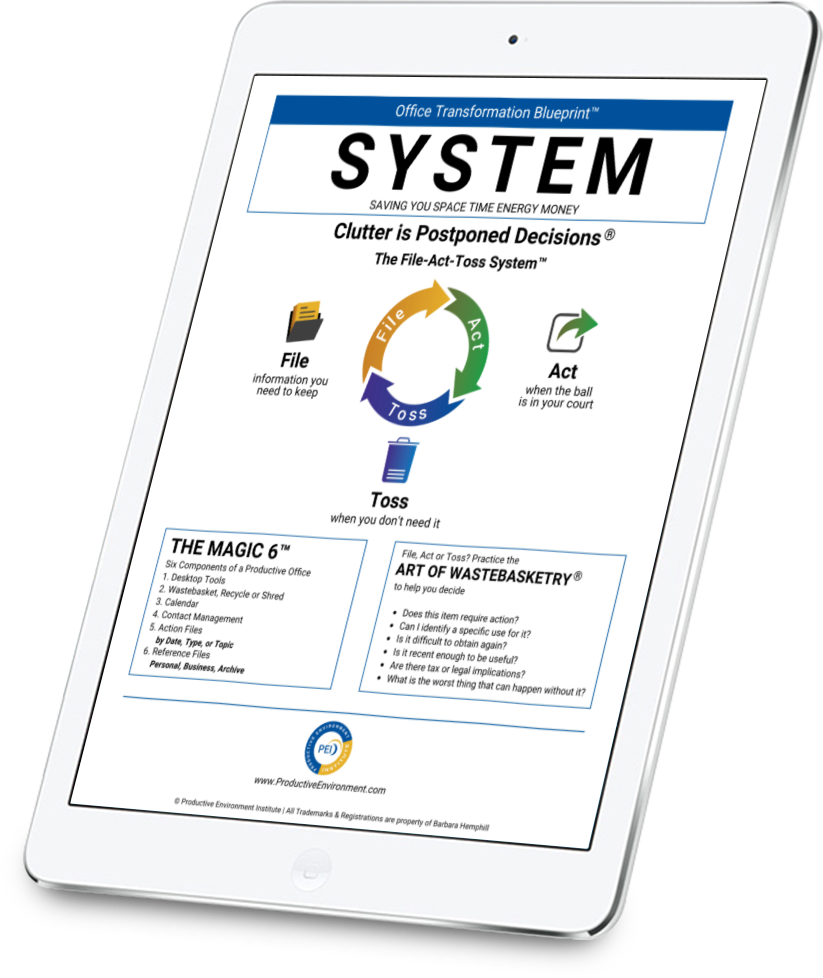Productive Environment Blog

Productivity Bites | Kathy Muzik
“To keep the body in good health is a duty; otherwise, we shall not be able to keep our mind strong and clear.” – Buddha
What would you think if I said food affects your productivity?
It's true! What you eat, how you prepare it, and when you eat it all make a difference. (And I'm looking beyond the obvious after-effects of a daily caffeine boost or the recommendation to eat less processed food.)
To be clear, I'm not a doctor. But as a productivity coach, I've seen firsthand how habits and routines significantly boost health, performance, and efficiency.
One of the most crucial yet often overlooked aspects of productivity is diet. The food we consume, our methods of preparing it, and our timing to eat it directly impact our energy levels, cognitive function, and overall well-being. These factors all play a role in our ability to be productive.
You undoubtedly have enough challenges keeping all the balls in the air. Consider incorporating some of the following quick tips to make things easier for yourself.
The What.
Our brain consumes about 20% of the body's energy, which primarily comes from the food we eat. As a result, what we choose to fuel our bodies with can significantly impact our brain function.
Glucose is the brain's primary energy source. However, this doesn't mean that all glucose sources are created equal. Complex carbohydrates like whole grains, vegetables, and legumes provide a steady supply of glucose, leading to sustained energy and focus. In contrast, simple carbohydrates and sugary snacks can cause spikes and crashes in blood sugar levels, leading to extreme fluctuations in energy and productivity.
To give your brain the best, most consistent fuel possible, try to incorporate the following:
Omega-3 Fatty Acids: Found in avocados, flaxseeds, and walnuts, these fats are crucial for brain health. They support the structure of brain cells and enhance communication between neurons. And who doesn't want enhanced communication between their neurons?
Antioxidants: Berries, dark chocolate, and nuts are rich in antioxidants that protect brain cells from damage and reduce inflammation, which can impair cognitive function.
Vitamins and Minerals: Vitamins like B6, B12, and folic acid, found in leafy greens, eggs, and lean meats, play a pivotal role in brain function and mental clarity. Iron, magnesium, and zinc are vital for maintaining focus and energy levels.
Water: Dehydration can lead to fatigue, headaches, and impaired concentration. Even mild dehydration can affect your productivity. Therefore, it's essential to drink adequate water throughout the day. Incorporating water-rich foods like cucumbers, oranges, and watermelon can also help maintain hydration levels.
The How.
You probably haven't thought about it, but how you prepare your meals and stock your kitchen can boost your productivity. Unless you're a professional chef or consider cooking your hobby, you likely want to spend less time in the kitchen while still eating well.
Here are some suggestions that may help:
Batch Cooking: Prepare large portions of meals like soups, stews, or casseroles and freeze them in individual servings. This approach saves time and reduces the stress of daily cooking.
Healthy Snacks: Stock up on convenient and nutritious snacks. Pre-cut veggies paired with hummus can be a great snack. Yogurt with healthy granola and fresh fruit offers a balanced snack rich in protein and fiber. Opt for healthy choices you can retrieve easily.
Balanced Meals: Ensure each meal includes a mix of protein, healthy fats, and complex carbohydrates. This balance keeps blood sugar levels steady and energy consistent. No more afternoon slump!
The When.
When you eat can influence your productivity.
Skipping meals or going too long between meals can lead to low blood sugar levels, which can cause fatigue and irritability. On the other hand, overeating, especially at lunch, can lead to a post-meal energy droop.
If possible, create a daily schedule that includes set times for meals and snacks. Doing this can help prevent grazing and encourage eating balanced meals.
Here are some other considerations regarding when you eat:
Morning: Eating within two hours of waking helps kickstart your metabolism and provides energy for the morning. A nutritious breakfast can prevent mid-morning energy crashes.
Evening: Foods like cherries, which are high in melatonin, can improve sleep quality. Most of us can improve in this area.
Late-Night: Avoid heavy meals late at night! Eating large meals before bed can disrupt sleep and negatively impact productivity the following day.
And throughout the day, taking time to eat without distractions can improve digestion and meal satisfaction. This mindful approach can also reduce overeating and promote better concentration.
View food as fuel for your success. Prioritize a balanced diet, minimize your hours in the kitchen, and use meal times to promote maximum focus during the day and quality sleep at night. The benefits will not only reflect in your work but also your overall well-being.
Do you feel like you could be more productive? Learn your personal productivity score at https://www.newpathpro.com/scorecard.
Photo: Unsplash+ in collaboration with Sumaid pal Singh Bakshi
Meet Our Team of Experts

BARBARA HEMPHILL
FOUNDER
Productive Environment Institute

ANDREA ANDERSON
CEO
Productive Environment Institute
CONTACT US
Use the Contact button on this page or
Leave a Voicemail @



